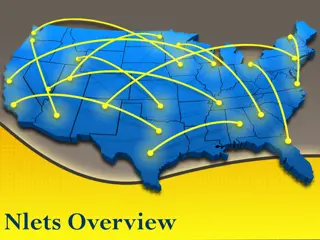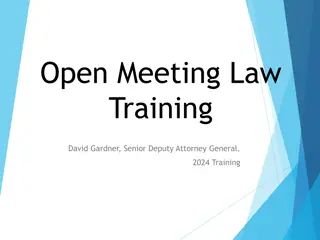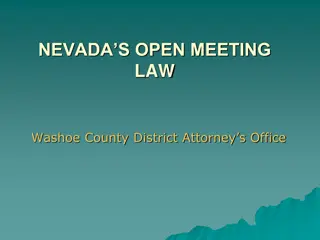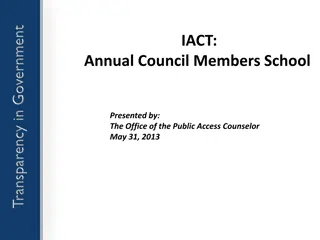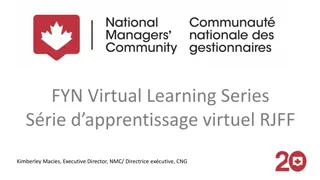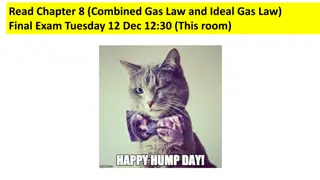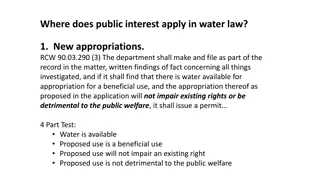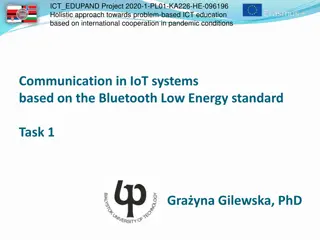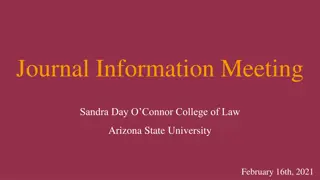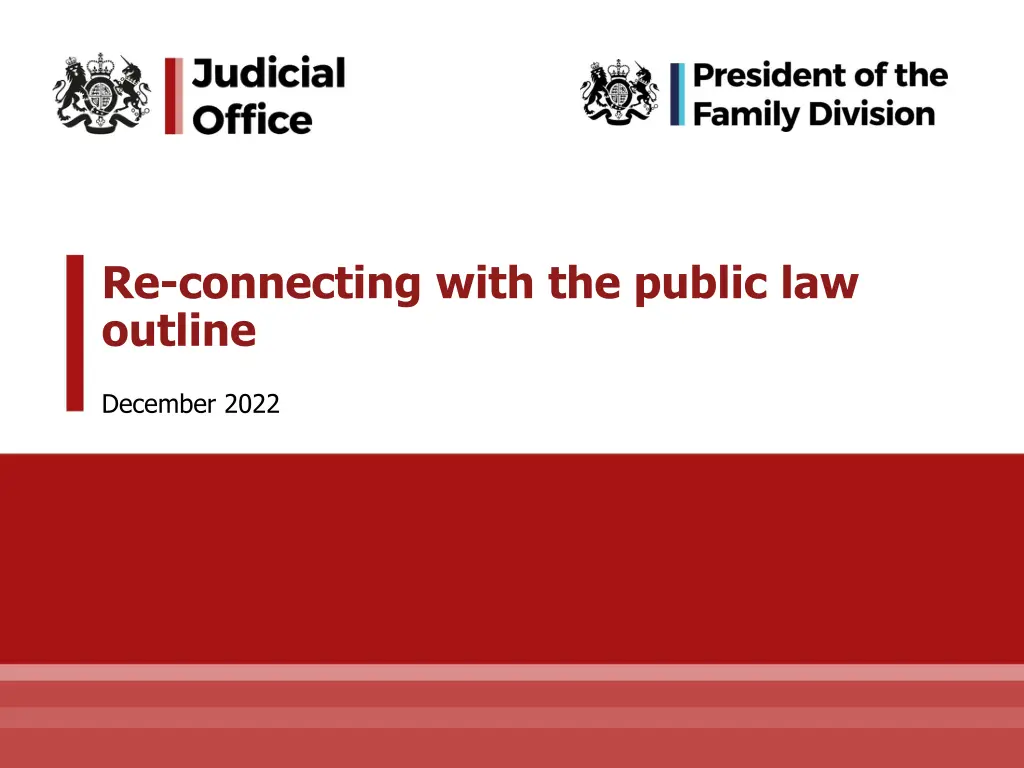
Public Law Outline Guidance for Efficient Case Management
Learn key messages on efficient case management in public law, including the importance of reducing delays, managing child timetables, and complying with gatekeeping orders. Discover tips on preparing for the first case management hearing and handling urgent applications to streamline the legal process.
Download Presentation

Please find below an Image/Link to download the presentation.
The content on the website is provided AS IS for your information and personal use only. It may not be sold, licensed, or shared on other websites without obtaining consent from the author. If you encounter any issues during the download, it is possible that the publisher has removed the file from their server.
You are allowed to download the files provided on this website for personal or commercial use, subject to the condition that they are used lawfully. All files are the property of their respective owners.
The content on the website is provided AS IS for your information and personal use only. It may not be sold, licensed, or shared on other websites without obtaining consent from the author.
E N D
Presentation Transcript
Re-connecting with the public law outline December 2022
Key Messages 1) Meet with partner agencies in advance, emphasising shared interest in eliminating delay and improving throughput of work within the system. Work with senior managers in the Local Authority to manage the tension between holding all parties to the child s timetable whilst recognising the very real resource issues local authorities face. 2) For reform weary professionals, it is helpful to drive home that this is nothing new. There are no great new initiatives to come to terms with. 3) The aim is to decrease not increase workloads by getting back to core principles of good case management. Less is more . 4) Every case management decision must be underpinned by the principle that delay is harmful for children. The 26-week statutory duty enshrines the welfare imperative that children need timely permanency decisions. Extensions to children s timetables should be regarded as exceptional. Guardian s need to be encouraged to be robust in representing the child s interests in case management decisions. 5) The majority of cases should require no more than two or three hearings. 2
The Childs Timetable Issue of Proceedings Urgent applications: should be the exception not the norm. Applications seeking a first hearing outside 12- 18 days should be genuinely urgent. The C110a must set out clearly the grounds on which an urgent hearing is requested. If reasons are not provided or deemed inadequate, an urgent hearing will be refused. Minimising delay on interim matters: if an urgent contested hearing is required, the matter should be listed with the clear expectation that it will be dealt with at that hearing and not further adjourned. The child s timetable should not be derailed by prolonged disputes at the outset of proceedings. A proportionate approach must be taken to interim decision-making. 3
Preparing for the first case management hearing 4
Compliance with gatekeeping orders The gatekeeping order must be complied with to ensure that the first CMH is effective. 1) Responses to threshold must be filed and served so the parents case is understood in advance of the CMH. 2) A culture of non-compliance by third party agencies must be tackled. If police, health or education are not providing essential disclosure in accordance with court orders, they should be directed to attend a non-compliance hearing. The Local Authority must bring any non- compliance by third parties to the immediate attention of the court. This can be done quickly and simply by way of a clearly headed email. Consider listing non-compliance hearings for 15 minutes at the start of the court list, to be vacated upon compliance. Experience suggests third parties will comply if the alternative is appearing before a judge. 5
Assessment plans: consider directing the Local Authority to file and serve an assessment plan in advance of the CMH. This should ensure proper engagement by the local authority with their pre-proceedings work and require them to focus on what, if any, further assessments are required and why. If a period of further intervention and support for parents is required, the expectations on the parents should be set out clearly, along with a timescale for any updating assessment. Part 25 applications: Part 25 applications must be filed in advance of the CMH and properly constituted with identified experts, timescales and costs. 6
The first case management hearing 7
In all but the most complex cases, the court will expect to set a clear timetable for the child at the first CMH which timetables the case through to the Issues Resolution Hearing. Any case management decision which would require the IRH to be vacated and re-listed should be closely scrutinised against the now measurable delay it would cause for the child. Further case management hearings should be regarded as exceptional, requiring specific justification. They should not be listed as a matter of course to review assessments or for the court to oversee the next steps. Consider agreeing timescales with the local authority for standard assessments such as parenting or kinship assessments which are consistent with the 26-week duty. Do not deviate from them unless there is a very clear reason to do so. Parents should be specifically warned that non-engagement with assessments may lead to the assessment being negative or discharged. Parents should be encouraged to understand that now they are in proceedings, they will be expected to work to the child s timescales. 8
Kinship assessments should always consider, and be compliant with regulations, for all possible orders. Parents should be specifically warned that connected carers identified late in the process may not be assessed if it causes delay for the child. There is no entitlement to assessment. Split hearings cause delay. They should be reserved for those truly single issue cases or where welfare planning cannot proceed on an either/or basis without core disputed facts first being determined. Re-focus on the statutory test of necessity for the appointment of experts. Encourage social workers to have confidence in their own professional expertise and judgment without recourse to ISWs and psychologists. Avoid listing through to final hearing. The clear message from the court should be that the case will be expected to resolve at IRH. Listing a final hearing at this stage may undermine that message. 9
Ensuring compliance with court directions for the filing of evidence 10
Remind all parties of their obligation to ensure compliance with the child s timetable and to bring any default immediately to the court s attention. Consider implementing a system whereby non-compliance issues can be quickly brought to the court s attention, the matter listed, and any default addressed. Using email as a quick and easy way to notify the court of any non-compliance can avoid the cost and delay of a formal C2 application. If there are particular issues with persistent default such as local authorities filing their final evidence late, consider including a standard direction for a non-compliance hearing to be listed 48 hours after the filing date, only to be vacated upon confirmation of compliance by the local authority. Again, such confirmation can be quickly and easily provided by email. 11
Effective Issue Resolution Hearings 12
Robust management of Issue Resolution Hearings can avoid the stress and delay of final hearings for both children and parents. Consider listing four or five IRHS together in one list and creating an environment at court focused on dispute resolution and settlement. Make clear to the parties that the purpose of the IRH is for the judge to assist them in trying to resolve matters. It is often helpful to remind parents that the delay caused by waiting for a contested hearing is not welfare neutral for the child. A firm judicial indication, with the usual caveats, should always be given where it will help narrow issues or resolve the case. Rarely should the court just accept being told that the matter is contested, and a final hearing is needed. Where narrow matters remain in dispute, such as frequency of contact, they can usually be fairly and proportionately dealt with on submissions at the IRH. The court should not seek to micro-manage the local authority s care planning. The court is only called upon to approve the key permanency provisions of the care plan as provided for in s 31A of the Children Act 1989. 13
If a matter cannot be resolved at the IRH, parties will be expected to think carefully about the witnesses required and a proportionate time estimate for the final hearing so a listing can be fixed. An application is required for permission to call an expert, focusing on the matters to be challenged and why it is necessary and proportionate to hear oral evidence. There is no right to cross-examine a witness. Expert availability should be obtained in advance of the IRH. The parties should not leave court without a fully completed witness template detailing witnesses and the allocated time for each party to put questions. Time for preparation of judgment should always be included within the time estimate to avoid delays caused by judgments needing to be reserved. 15








